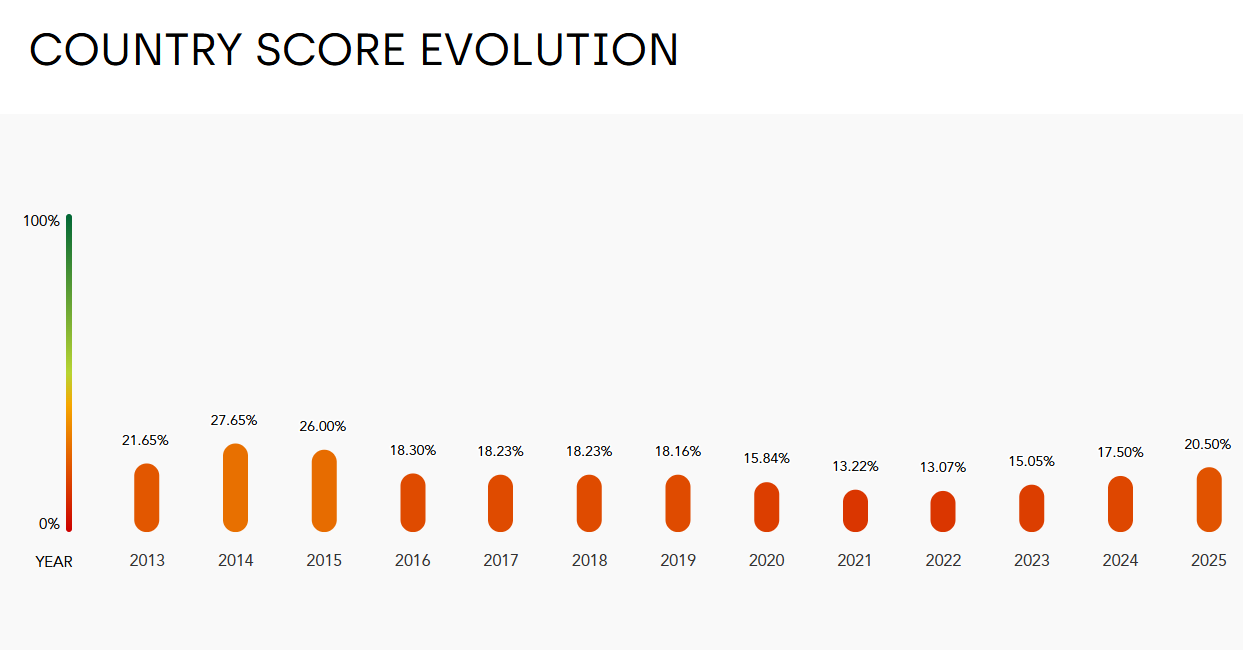Poland’s LGBT+ Landscape: A Shift in the Rainbow Map Rankings
Poland’s recognition as a more progressive nation for LGBT+ rights marks a significant moment in the country’s evolving social landscape. For the first time since 2019, Poland is no longer the lowest-ranked country in the European Union regarding LGBT+ rights. This change has been reflected in the latest Rainbow Map, published by ILGA-Europe, an influential NGO based in Brussels.
A Chance for Change: The Rainbow Map Insights
A Glimmer of Hope
Poland’s score improved from 17.5% to 20.5%, creating a remarkable shift in perception both locally and internationally. Though still positioned as the second-lowest in the EU—just above Romania—this elevation is seen as a crucial step forward. Romania’s score slightly dipped from 18.86% to 18.63%.

Poland’s Rainbow Map score since 2013 (source: ILGA Europe)
A Look Back: Historical Context
Poland’s LGBT+ community has faced substantial challenges, particularly under the national-conservative Law and Justice (PiS) government, which previously plunged the country to a low of just over 13% in 2022. The campaign against “LGBT ideology” created an atmosphere of hostility, raising concerns both domestically and abroad.
A New Dawn: Political Change
With the election of a more liberal government in 2023, Poland has gradually risen in the rankings. Despite failing to implement promised reforms to enhance LGBT+ rights, the fresh leadership has initiated a cultural transformation.
Progress Amidst Obstacles
Civil Society Space: Gradual Improvements
One notable area of improvement for Poland lies in the realm of civil society. Over the last three years, LGBT+ events have been held without state obstruction, a stark contrast to prior years. In fact, over 35 marches transpired peacefully last year, although concerns remain regarding inadequate police protection during these events.
ILGA-Europe’s report highlights, "the protection of these events is not adequate," indicating that some incidents during marches did not elicit a strong police response.
The Withdrawal of Anti-LGBT+ Resolutions
Moreover, a significant milestone has been the withdrawal of anti-LGBT+ resolutions introduced by over 100 local authorities in 2019 and 2020. The last of these resolutions was repealed last month, largely due to pressure from the European Union, which threatened to withhold funding.
The Challenge of Hate Crime and Discrimination
Despite these advancements, ILGA-Europe continues to assign Poland a zero score in both the "hate crime and hate speech" categories. This stark statistic underscores the enduring challenges faced by the LGBT+ community, including the lack of protections against hate crimes and the absence of recognition for same-sex unions or adoption rights.
Legislative Roadblocks Ahead
Though the new ruling coalition pledged to expand hate crime laws, including protections for sexual orientation and gender identity, efforts have stalled. President Andrzej Duda has refused to sign into law a pivotal bill aimed at criminalizing anti-LGBT+ hate speech, sending it instead to the constitutional court for deliberation.
Conclusion: A Journey Towards Equality
As Poland navigates the complex landscape of LGBT+ rights, the journey is far from over. The recent rise in the Rainbow Map ranking presents a glimmer of hope amid ongoing challenges, serving as both a reminder of the work still needed and an encouragement for continued advocacy.
For further insights, visit the ILGA Europe Rainbow Map.
By monitoring these developments closely, we can observe how Poland transforms its landscape for the LGBT+ community in the coming years. The story continues, and we must remain engaged in supporting the rights of all individuals.






